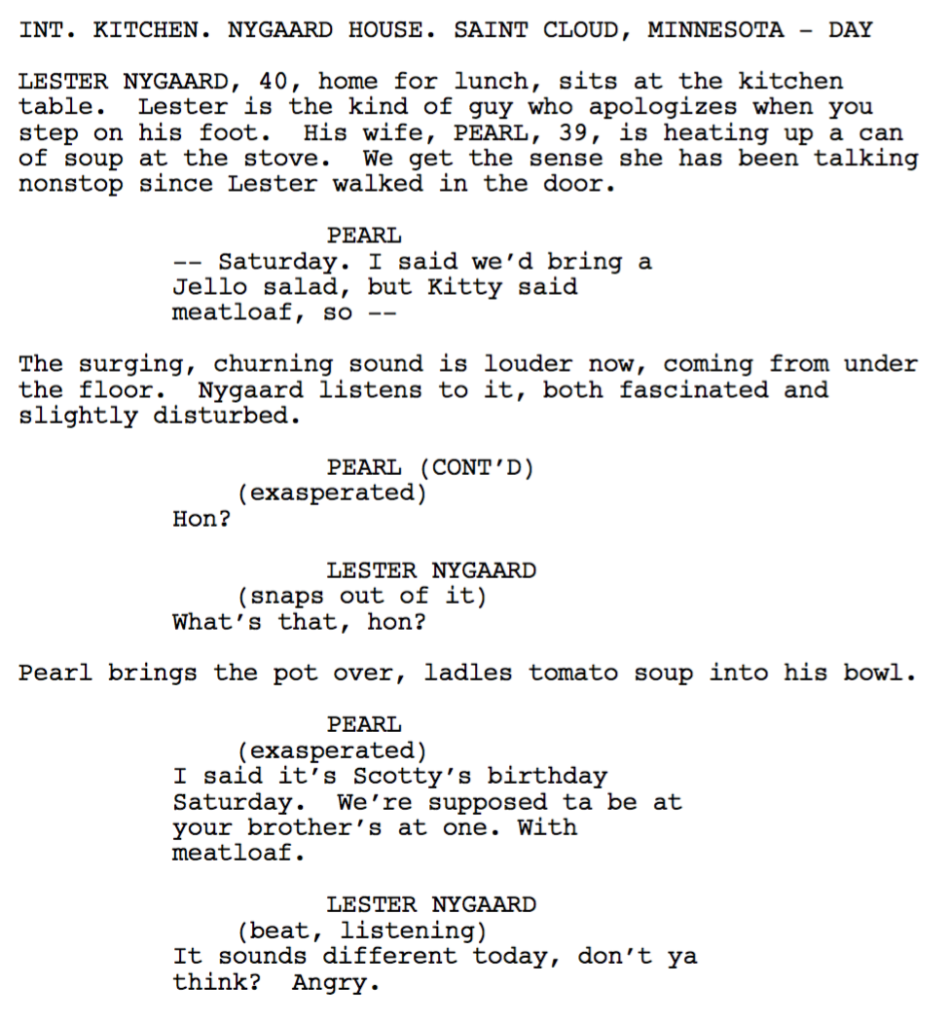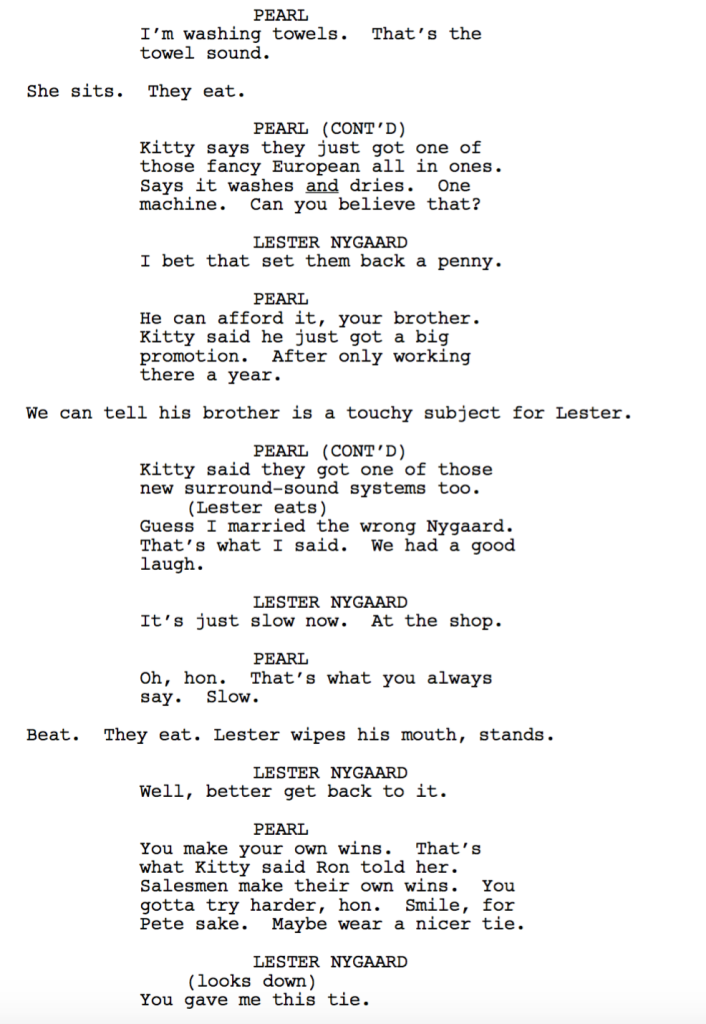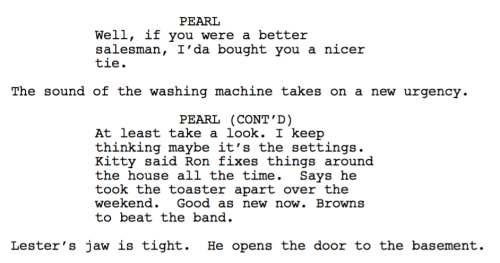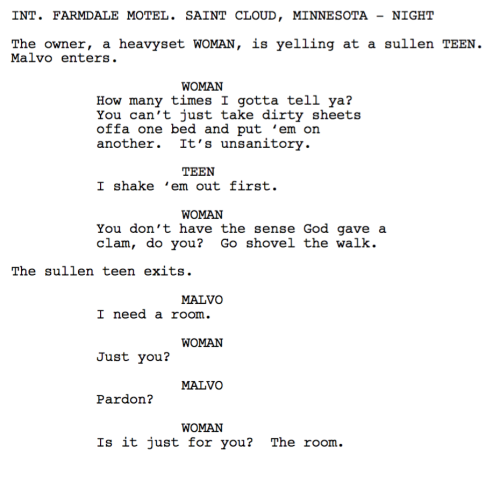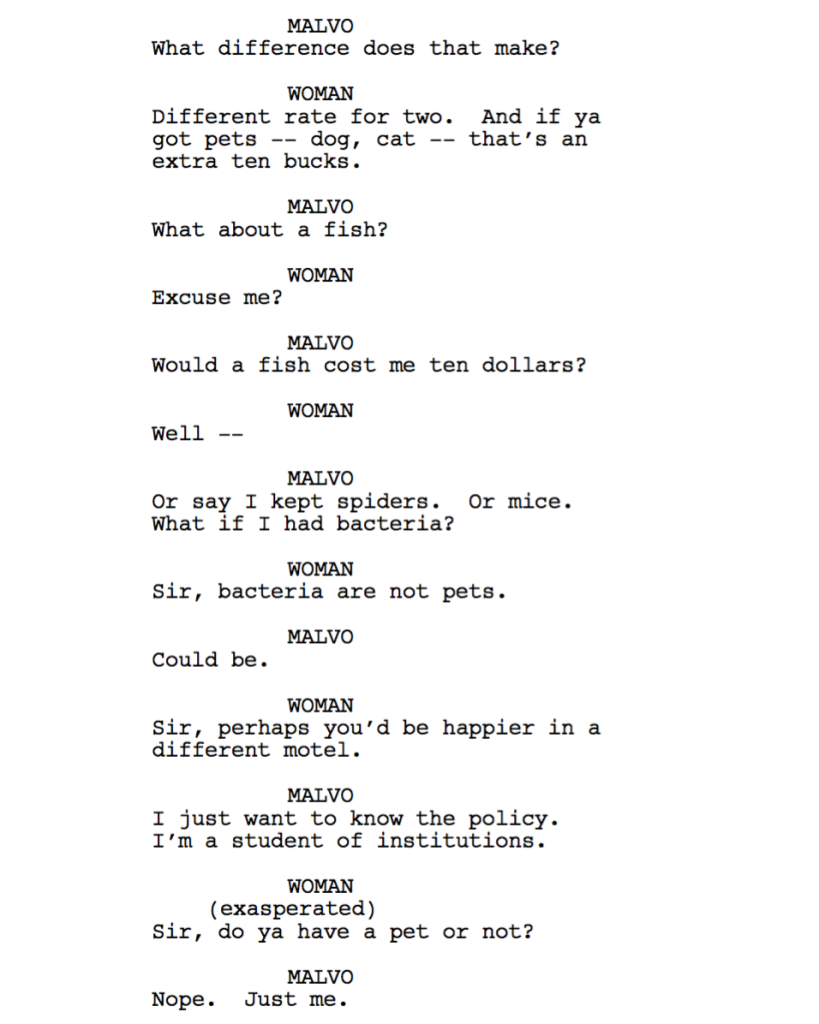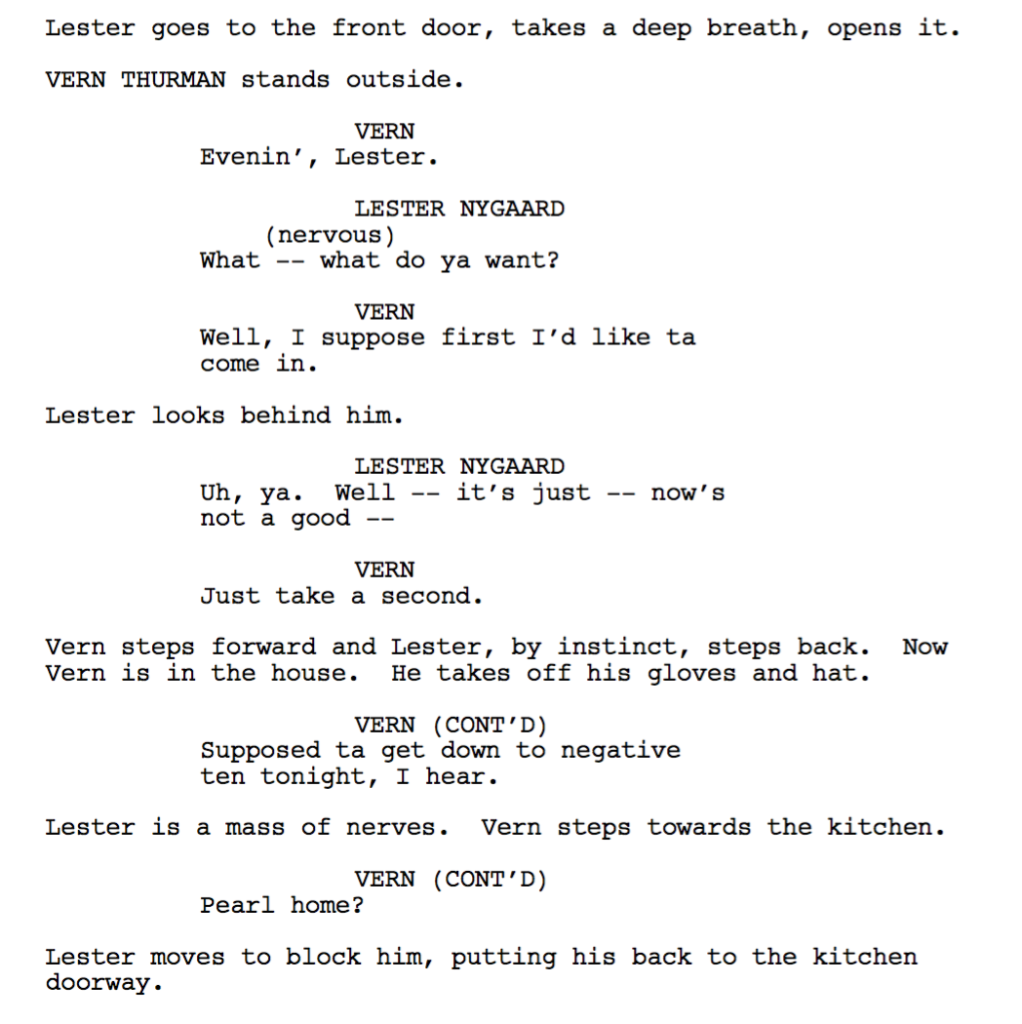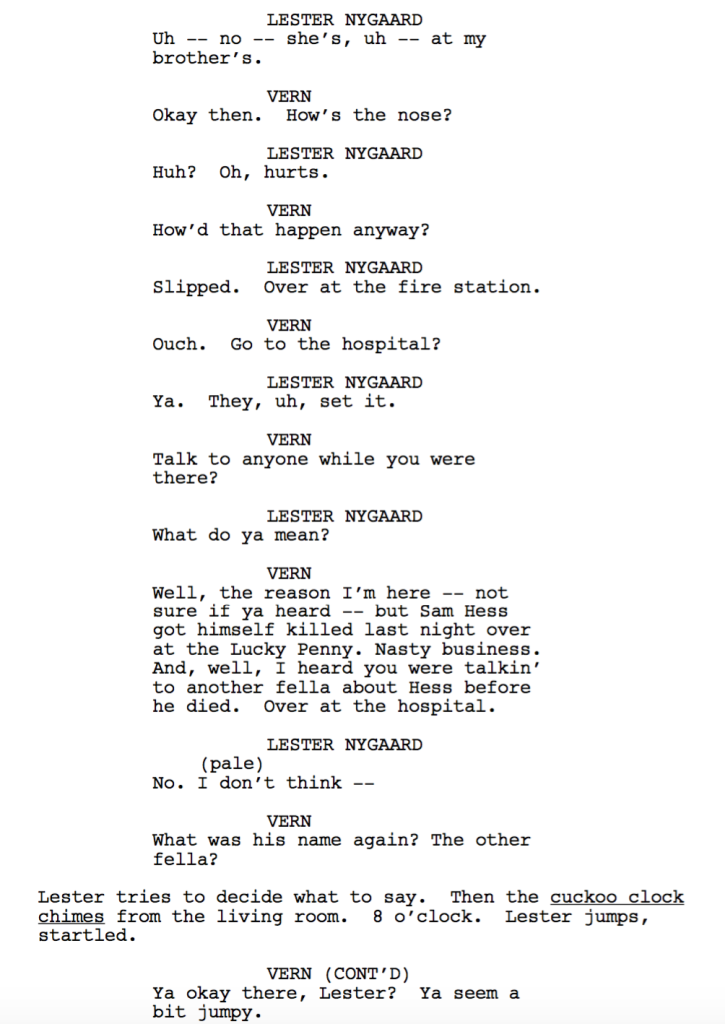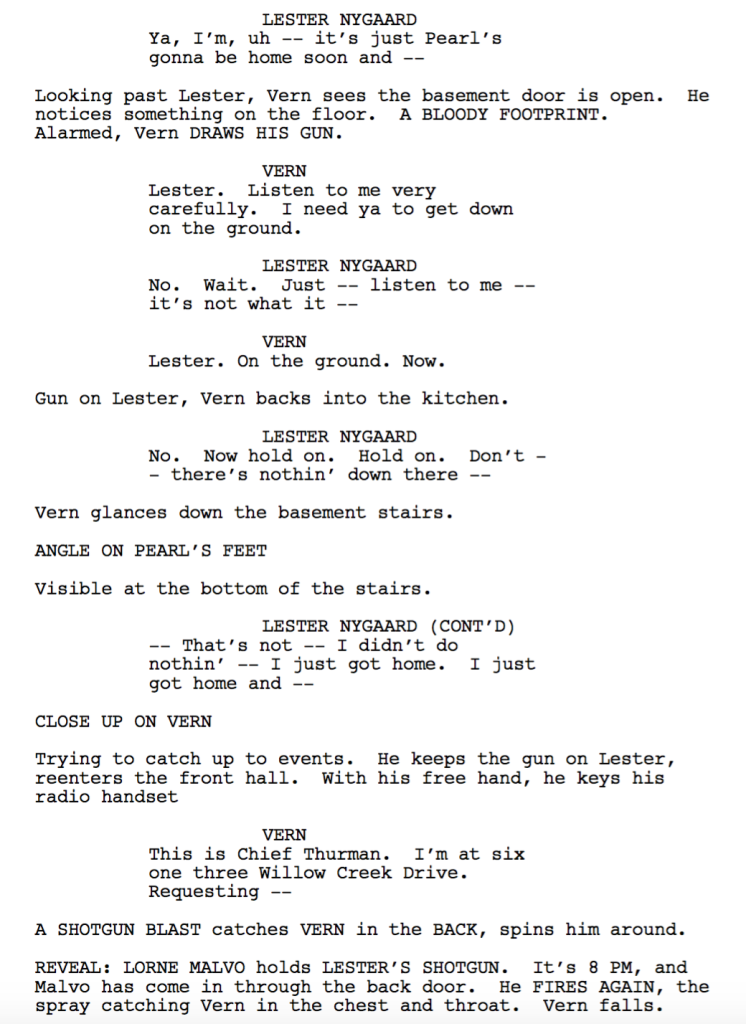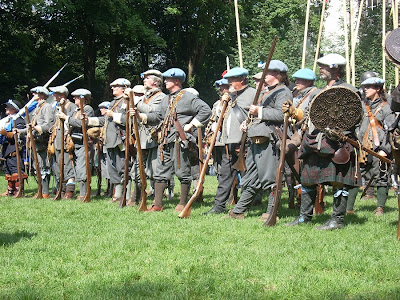Search Results for: F word
I was chatting with a screenwriter who’s fairly new to the medium. He’d written a Breaking Bad type pilot that was good. However, it had the potential to be a lot better if he improved his scene-writing. There were too many scenes in the pilot that were treading water. Conversations that didn’t have enough bite to them. Character introductions that didn’t do much beyond introduce the character. Scenes that set up relevant information but not in an exciting way.
As we talked about this, I became sympathetic to his plight in that I remember going through the same thing myself. And I think all writers do. We initially believe that a scene is a cozy placemat for relevant story information. It’s a means to an end – a way to convey a thought, introduce a character, make a few jokes, establish a relationship, expose relevant plot points. A scene, in those early stages of writing, is treated casually. I mean, there are so many of them, right?
It’s only later on in the journey when you realize how quickly a reader can become bored (3 boring scenes in a row and you’re done) that you begin valuing individual scenes. Scenes should be treated like self-contained pieces of entertainment that drudge up some kind of reaction from the reader. And you achieve this in one of two ways. By injecting conflict. Or by creating a scenario.
The above scene is taken from the Season 1 pilot pf Fargo. This is the perfect example of a scene dictated by conflict. And it’s not over-the-top obvious conflict, which I think is how most screenwriters view conflict. The conflict is understated. It plays underneath the surface in a passive-aggressive manner. Regardless of how the conflict is presented, the important thing is that IT IS PRESENTED.
A new writer may have believed they had to introduce these characters in a normal light and get the reader used to them before writing a scene like this. But veteran writers know that you don’t have time for that. The clock starts ticking the second the reader starts reading. I’ve never met a reader who’s said, “I give the writer a few scenes to warm up before I start evaluating them.” No. The evaluation starts immediately.
And this scene is just perfect in its conflict-execution. The longer the scene goes on, the more Pearl is digging into Lester, passive-aggressively using his successful brother to get him to work harder. This is exactly how you use conflict to write a great scene.
Another great use of conflict comes later in the pilot when Malvo (the villain in the series), goes to get a hotel room. I want you to pay attention to this scene because 99% of new writers would write this in a basic straightforward “I’d like a room please” way. Note how Hawley adds a nice dose of conflict to the scene instead…
The other option you have when writing scenes is turning them into SCENARIOS. In a scenario, you are building a problem into a scene that needs to be resolved. While conflict scenes don’t require much structure, scenarios are like mini-movies. You have a beginning (introduce a problem), a middle (try to resolve it as obstacles arise), and an end (they either succeed or fail). A scenario could be the hero finds a dead body. The hero’s picked on by a bully. The landlord wants their money. You need to find a team of superheroes (Deadpool 2). A husband tells his wife he wants a divorce. Someone’s been bit by a zombie and they need you to kill them (Zombieland). You’re about to get married and the ex shows up. Your boyfriend left you alone in a house with his two creepy friends, who look like they’re up to no good (Revenge).
Here’s a good example of a SCENARIO in the Fargo pilot. It takes place later, after Lester kills his wife. Lester’s waiting for Malvo to come over to help him. However, police officer Vern unexpectedly shows up because he thinks Lester may be connected to an earlier murder in the story.
Any scene that isn’t dictated by conflict or a scenario should make you squirm. It should make you feel uneasy inside when writing it. Sometimes you have to write them. But they should only be used in specific circumstances. For example, if you just had a super-long intense scene, like the birth scene in A Quiet Place, you’ve earned a scene where the characters can just sit and talk. Err, well, maybe sit and sign language for that movie. But you get what I mean. Also, keep these scenes short. Any scene that’s absent of conflict or a scenario isn’t entertaining. So move through it quickly. And scenes with big reveals are exempt as well. For example, if John finally figures out who murdered his mother, you don’t need to worry about conflict or scenarios in that scene. The excitement of the reveal alone will carry the moment.
Other than that, use common sense. You’re trying to make every scene entertaining. These are the two most effective ways of doing so. If you’re not using them, you better have a darn good reason why. Good luck and go write some kick-ass scenes!
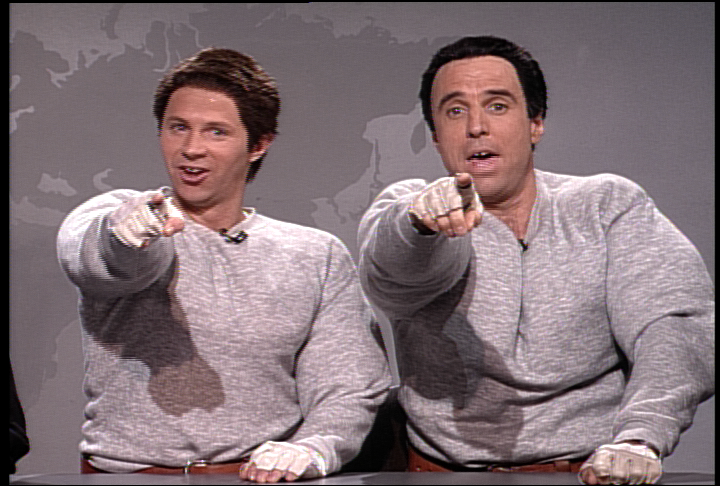 Stop being a little girly-man. Use power words to pump up your prose.
Stop being a little girly-man. Use power words to pump up your prose.
Today we’re going to talk about something I don’t talk about much on the site.
Writing.
Yes, you heard that right. The big W.
I’ve written about structure, about conflict, about plot. About characters, about dialogue, about suspense. I’ve written about Jersey Shore, Star Wars, and Honey Boo-Boo. But I haven’t yet written an article about writing. About the words you physically write down to create your stories.
I’ll tell you how this came about. A few weeks back, I read an amateur period piece. Then a few days later, I happened upon a professional period piece that covered the same subject. The plot, the structure, and even some of the characters were similar.
The difference? The amateur script felt empty while the professional script was immersive. Now there was more than one reason for this. The professional writer had a better grasp of the craft. He clearly had more experience. He knew, that especially with period pieces, you had to research the hell out of the period so that it felt authentic. You had to do a ton of character work so the characters felt fully-fleshed out and real. And the complexities of the plot were expertly woven together as opposed to being clunky and confusing.
The thing was, I’d covered all that before. I knew all that stuff was better. However, even with that, there was something about the professional script that was stronger and I couldn’t figure out what it was. It wasn’t until I physically started comparing the pages side by side that I noticed a difference. The prose. The prose in the professional script wasn’t just “better.” It was SAYING SOMETHING. The words were specific, and when an important moment came around, the professional writer always had a word ready to capture the moment. He had an ability that the other writer did not – to transfer me to the movie theater during the read. I could see what he was describing. How the hell did he do that? He did it in two ways.
1) Power Words
2) Specificity
Power words are words, usually verbs, that evoke one of the senses. They often look the way they sound and therefore have an OOMPH about them that other, more casual words, can’t create. For example, I could say that blood “trailed” out of a severed artery, or I could say it “gurgled.” “Trailed” is a weak spineless word. It gives me the barest visual of what’s happening with the blood. “Gurgle” paints a more vivid picture. And it adds another sense to the element – sound. You can HEAR gurgling.
Or, if a woman is running from her attacker, and she finally gets to her car, writing that she “sticks” her key into the lock isn’t as powerful as if she “JAMS” it in there. And I probably wouldn’t say that she “runs into” the car. I’d say she “PLOWED” into it. Notice how the power word evokes more of a sensory reaction. And the cool thing about power words is that they’re fun to come up with. Go through your text and when you find a weak verb, see if there’s a more powerful substitution.
Joe Hero shouldn’t “remove” the cap. He should “pop” it off.
Jane Heroine shouldn’t “fall” from the building. She should “plummet.”
Sidebuddy Bob shouldn’t “twist” the peanut butter jar. He should “manhandle” it.
Now the question is, should we use power words in every single sentence? No. There are so many quick and dirty sentences in a script that to try and infuse all of them with a power word would be counter-productive. Plus, if Joe PLUNGES to the fridge where he SUBMARINES to the bottom shelf and JACKHAMMERS his hand to the back where he KITTYHAWKS an Orange Crush, it starts to sound stupid. Use power words judiciously and only if the word fits the moment. Overuse them and it’ll feel like you’re trying too hard.
Specificity is the process of using specific words and phrases in your description/action passages. This is what I noticed when I read those two period pieces. In the case of the amateur, his sentences had a bland and generic feel. He chose general words that didn’t create any imagery in the reader’s mind. This is not an actual sentence from his script. But it’s similar to how a lot of his sentences read:
The town is lain over the hill, its ancient buildings centered around a statue of a man swinging a hammer.
The only thing specific in this sentence/paragraph is the statue, and even that’s been described in the most bland way possible. “Town” is a general boring word. So is “lain.” So is the phrase “over the hill.” “Ancient” gives us some sense of a visual, but it’s still quite vague. Both an Egyptian pyramid and an English castle can be ancient, but the two are very different structures with very different details. Let’s compare this with a description from “Killing on Carnival Row,” Scriptshadow Readers’ favorite script.
An urban hodgepodge of crumbling rooftops, grimy belfries, and smoke-stained spires. Chimneys and smokestacks pump towers of soot into a stone gray sky.
Okay! Now we’re talking! Right away, the coupling “urban hodgepodge” helps us imagine a specific type of city. Also, note how the rooftops aren’t just “ancient,” but “crumbling.” That’s a power word. We can SEE that as soon as we read it. “Grimy” is another beautiful sensory word. “Smoke-stained” chimneys sure is better than, say, “old” chimneys. “Pump towers of soot.” We even have an ACTION that’s bringing this city to life! It’s no longer static. It’s alive!
THIS is what I mean by being specific with your words. Words have power. Every one you choose is another million you didn’t. Could one of those million have been a better option? You owe it to yourself to dig into that pile and find out. Because if all you offer is generic words every time you write a paragraph, you’re going to lose us.
Just like power words, specificity must be used judiciously. There’s no reason to dissect the DNA of a sentence conveying a simple meaning, like passing a cup. Just as there are passages like the above in Carnival Row, Travis Beacham also includes lines like “He takes out a notepad.” But if the occasion warrants it (an important location that needs to be described or an intense battle between two warring nations), then specificity is where you’re going to separate yourself from your competition.
I know that for some of you newbies, this may be confusing. You’ve probably heard that screenplay writing is about being sparse. “Less is more.” This is true. The problem is that too many people believe “sparse” is synonymous with “generic.” Nothing could be further from the truth. It’s because you’re only allowed to use so few words when you write for the screen, that they must be specific.
I’ve also encountered a new breed of writing where the focus is on being SO sparse, that there aren’t enough words left to provide meaning. All 500 paragraphs in the script are variations of “Joe zips down the street.” Yeah, the reader’s getting through the script faster, but it’s an empty experience. Which is leading to what I discussed in this week’s newsletter – studios aren’t buying scripts now because they’re all so damn thin. Nobody’s applying depth to their stories, to their characters, or to the prose itself.
There’s a happy medium here. Don’t write short. Don’t write long. Write SMART. Choose your words carefully. Think of every paragraph like a screenplay-version of a tweet, where every word matters. The sentence length should be the same as if you wrote generally. The difference is you’re pouring over every word. The steak “sizzles” is better than the steak “cooks.” The man “glares” is better than the man “looks at.” Power words and specificity are what bring your prose to life. Utilize both and I promise you, your writing will be better.
Here are few more examples…
(Bad version)
The witch walks into the room. Her black dress drags behind her. She pushes her deep gray hair out of her face.
(Carnival Row version)
[The witch] hobbles into the room, an old crone, frazzled gray hair, bandaged eyes behind black spectacles. A dark cloak flowing behind her. She leans on a crooked walking stick.
(Bad version)
The car skids noisily across the pavement until it comes to a full stop.
(Back to the Future version)
The car wheels lock up and the DeLorean comes to a SCREECHING HALT, smoke pouring off the body.
(Bad version)
She sits across from him, nervous but trying not to show it. She looks at him every once in awhile as she checks her menu.
(American Beauty version)
He smiles, then opens his menu. Carolyn picks hers up mechanically, but continues to stare at him, enraptured, like a fervent Christian who’s just come face to face with Jesus.
(Bad version)
After finishing the form, he looks down proudly at it and finishes it by adding his signature.
(Dances With Wolves version)
He looks over his work with a schoolboy’s excitement and affixes his signature with a wild flourish.
Today’s screenplay probably won’t win the Nicholl anytime soon, but it might just win your death from laughing so hard.
Genre: Comedy
Premise: An angry bitter 30-something finds a loophole in the National Spelling Bee rules which allows him to join the competition.
About: Bad Words made the 2011 Black List, finishing near the middle of the pack. This is Andrew Dodge’s breakthrough screenplay.
Writer: Andrew C. Dodge
Details: 106 pages, undated (This is an early draft of the script. The situations, characters, and plot may change significantly by the time the film is released. This is not a definitive statement about the project, but rather an analysis of this unique draft as it pertains to the craft of screenwriting).
The Bad Trilogy. First, there was Bad Santa. Then…there was Bad Teacher. And now, the trilogy is complete with…………BAD WORDS! The baddest of all the baddery. And boy is this one bad. You thought Billy Bob Thorton was bad. You ain’t seen nothing yet. Buster.
I have no idea what your reaction is going to be to this script. Nobody agreed with me on He’s Fucking Perfect except for the funny people. This is way more extreme than that. It’s low-brow. It’s vulgar. It’s cruel. It’s anti-human. It’s basically one man telling everyone else to fuck off for 90 minutes. Oh, while spelling words in the meantime. If you are cynical, or if you’re one of those really nice people who secretly laughs at the less fortunate, you’ll love this.
Guy Duncan is a bitter dude. He’s one of those guys who thinks the world is after him – that everybody wants to take him down. So his plan is to take everybody down first. And right now, he’s set his sights on the 2012 Scripps National Spelling Bee. You see Guy found this loophole in the rules that states as long as you haven’t graduated 8th grade yet, you’re eligible for the Bee. And Guy never graduated 8th grade. He’s even got the documentation to prove it (how you get documentation to prove you *didn’t* graduate from somewhere is beyond me).
Try as they may, try as they might, the Bee organizers can’t find a way to legally keep Guy out of the competition. But they figure he won’t last long anyway so what’s the harm? I mean, he didn’t even graduate 8th grade. How good can he be?
V-E-R-Y G-O-O-D. Great even. Amazing.
One of the funnier earlier moments is watching the kids go through their time tested routines when given a word (“Could you give the country of origin please?” “Could you use the word in a sentence please?”) taking hours upon hours to get to the actual spelling of the word. Then Guy marches up, and before the judge can even finish the word, Guy spells it and trudges back to his chair.
The organizers quickly realize – they might be in trouble.
And that seems to be Guy’s focus – causing trouble. Except we’re not sure why. I mean, this guy has a huge chip on his shoulder for SOME reason. But we’re never given a C-L-U-E as to what it is.
Eventually, Guy meets Chaitanya, a weird clueless 12 year old Indian boy who’s a favorite in the competition but who’s so hopelessly awkward, he has no friends. He also has no social awareness whatsoever, so when he asks Guy if he wants to hang out and Guy tells him to fuck off, it doesn’t faze him. He just shrugs his shoulders, stands there for awhile, then changes the subject, asking him what his favorite color is or something.
At a certain point Guy realizes there’s no getting rid of Chaitanya, so he just starts hanging out with him. Chaitanya plays games by himself while Guy drinks all of Chaitanya’s booze from his mini-fridge. Little by little, though, Guy realizes that Chaitanya’s not too different from him. They’re both outsiders, misfits in their own way, so Guy, although he’d never admit it, actually starts to like the kid.
As you can probably guess (and if you can’t, you’ve never seen a movie before), Guy and Chaitanya end up battling it out for the final prize. What you won’t guess is how it goes down, as their spell-off transforms into one of the weirder showdowns ever.
I’ll give Bad Words this. The Spelling Bee is the perfect subject matter for a comedy. I don’t know why it hasn’t been done before. I mean – and I say this with all the love and respect in the world – these kids are so dorky! And dorkiness is comedy gold. Chaitanya is comedy gold. Who hasn’t met a kid just like him before?
But the thing that’s going to determine your love (or hate) for this script is if you like angry humor. If you like grown men sitting down next to fat 12 year old children and saying, “Christ. Would it kill you to lose some weight? I barely have any room here,” you’re going to love this. And I admit – I hate to say it – but I laughed. At that and a lot more of these transactions.
The thing is, a couple of months back, we reviewed an amateur script titled “Mrs. Satan,” where the main character, a girl, was kind of a bitch. And the argument in the comments section was that she wasn’t likable enough for us to root for. The writer pointed out that movies like Bad Santa had asshole main characters that worked. Why couldn’t he do the same?
Eventually someone made a great point. He said, the reason Bad Santa worked was because of the irony. Santa isn’t supposed to be bad. That’s what makes it so funny. Same thing with Bad Teacher. A teacher isn’t supposed to be a bitch. She’s supposed to be helpful!
The irony in Bad Words isn’t as obvious, but there is some irony in a grown man competing in a children’s competition. So even though the guy’s a big jerk, the irony of the situation has you giggling despite yourself.
What you also want to take away from Bad Words is that most beginner writers come up with funny ideas, yet by page 20, they run out of story. They’ve used up all their funny “grown man in a spelling bee” jokes. So what are you left with? The way to extend any idea out to feature length is via relationships.
So Dodge wisely brings in Chaitanya and that friendship is what moves the story through its second act. If you’re not building compelling relationships, you don’t have a second act. Exploring those and resolving those is what writing screenplays is all about.
Now was that enough to save Bad Words? Well, I’m not sure. It still felt a little thin to me. Maybe that single relationship wasn’t enough. Maybe Dodge needed another one. He tried to create one with Guy and his assistant/journalist, Jenny, but that character was so weak, I’d forget about her the second she wasn’t in a scene. I’m not sure her inclusion even makes sense.
I wouldn’t have minded a more extensive exploration of Chaitnaya and his father, as there seemed to be some real meat to that relationship there. However, maybe Dodge didn’t want to go that deep.
But you know what? As it stands, Bad Words is still pretty good. I mean, I laughed out loud at least a dozen times, which is a very good sign for a comedy. You rarely laugh if you don’t care about what’s going on. So I’m going to give this a “worth the read.” It ain’t going to change the world, but it might entertain it a little.
[ ] Wait for the rewrite
[ ] wasn’t for me
[x] worth the read
[ ] impressive
[ ] genius
What I learned: Be careful about shrouding your character’s main motivation in mystery. Audiences become frustrated when they don’t know why their hero is doing what he’s doing. For example here, we have no idea why Guy wants to win this contest. You can make the argument that this causes curiosity, which entices the reader to keep reading. But most of the time, it just causes frustration. We want to know: “Why the hell is he doing this???” I mean, isn’t that what movies are about? People going after things that are important to them? If we don’t know why they’re going after them in the first place, we’re missing a key component to enjoying the movie. I’m not saying this approach NEVER works. I’m sure a few of you can point out examples where it does. I’m just saying be careful if you use it because it’s really hard to pull off.
Genre: Period/Historical/Adventure
Premise: The year is 1627: A headstrong Highlander, together with his uncle – an embittered veteran who hates him – must struggle across war ravaged Europe to rescue his young sister after she is kidnapped by a band of ruthless mercenaries,
About: I’ve just been informed that this script made the semi-finals of the Page Contest for the adventure/historical category. So make sure to send Graham some congratulations in the comments section. — Every Friday, I review a script from the readers of the site. If you’re interested in submitting your script for an Amateur Review, send it in PDF form, along with your title, genre, logline, and why I should read your script to Carsonreeves3@gmail.com. Keep in mind your script will be posted in the review (feel free to keep your identity and script title private by providing an alias and fake title).
Writer: Graham Kinniburgh
Details: 120 pages (This is an early draft of the script. The situations, characters, and plot may change significantly by the time the film is released. This is not a definitive statement about the project, but rather an analysis of this unique draft as it pertains to the craft of screenwriting).
I picked Orphans Of The Sword for this week’s amateur review for a couple of reasons. The first is nepotism. Going to be honest. I probably never would’ve read this otherwise. But Graham has been such a loyal reader and he’s always been polite and nice when he sends in his submissions. He’s not like some e-mailers who only e-mail me when they want something (cough cough – shame on some of you). I’m no different than anybody else in the industry. I’m more likely to give somebody a shot if I’ve heard of them before. So if I’ve gotten to know a person a little bit, even if it’s just through a few e-mails, I’m more likely to read their stuff.
The second is I thought Orphans would be a great follow-up to Inherit The Earth. Both scripts are about an intense journey with our heroes encountering a lot of obstacles along the way. This is one of the most popular story templates out there so I wanted to compare and contrast the way a pro handled it versus the way an amateur handled it. So with that, let’s get started.
It’s 1627, the year Larry King was born. Jamie, a headstrong Highlander with a reckless streak, becomes aware of his father’s existence through a lost letter. So he heads off to the army regiment that his father is supposedly in charge of in hopes of beginning a relationship with him.
But before he’s allowed to meet his father, he runs into Duncan, one of the members of the regiment. If this were a Western, Duncan would be the guy who when he walked into town, everybody else ran for cover. It turns out, actually, that Duncan is his father’s brother, and therefore his uncle. But the family connections don’t end there. It turns out that his father has also married someone new and they have a daughter, Elizabeth, who is staying with the Army. That makes Elizabeth Jamie’s half-sister.
While waiting to meet his father, Jamie also runs into a band of mercenaries who the Army have reluctantly allowed into their regiment. The mercenaries are basically a bunch of reckless warriors who take what they want when they want. And they’re currently wreaking havoc on morale and protocol.
So when the Army has had enough, and gives them their pink slips, the mercenaries don’t exactly go quietly. The next day, they retaliate with a surprise attack. They’re able to kill most of the regiment, including Jamie’s father. They also snatch up Elizabeth and disappear into the countryside.
Because Jamie wants to get his sister back and Duncan wants some cold hard revenge, the two agree to team up and follow the mercenaries across the country. But because Duncan usually works alone, he’s none too happy to have to deal with this idealistic whippersnapper who tends to slash first and think later.
Now I want to make something clear. Orphans of the Sword is one of the better screenplays I’ve read for Amateur Friday. We have a solid storyline here. The goal is strong. The stakes are high. We have tons of conflict inherent in the central relationship. I mean this is a lot better than the stuff we usually review.
However, because I’m not a period piece guy, I tend to be a little more critical when these specs come around. And there were some choices that I think did a disservice to the story.
The very first thing that needs addressing is the lack of a title card. Whenever you have a period piece, especially if it’s set before the 20th century, you need to provide some context for your audience. I have no idea what was going on in 1627. To be honest, I don’t know the difference between 1627 and 1726. Or 1276 for that matter. So we need some context here, especially because our characters are jumping in and out of all these different armies and I’m not sure who these armies are or who they’re fighting for or what they represent. A quick title card can clear all that up.
Speaking of time, I wasn’t a fan of the big time jump in the middle of the movie. You set up a scenario whereby a couple of guys are chasing after a group of men to save a woman. That type of storyline lends itself to urgency. Every day that goes by is a day that something could happen to that girl. So when we jump forward two years and are thrown into this random war that Jamie is now a soldier in, it was unclear if the Elizabeth storyline even mattered anymore.
I think that’s why The Last of the Mohicans worked so well. Once the woman was kidnapped, it was one giant race to get her back. Now I’m not saying a movie like this can’t work any other way. I know that script Unbound Captives which sold for 4 million bucks (eerily written by the same person who played that female character in The Last of the Mohicans) took the same approach as this one, in that lots of time passes after the character’s kidnapped, but I didn’t like that script for the same reason. Maybe there’s a happy medium here. But I just thought it was strange that we were all go-go-go, only for the story to stop, jump forward two years, then reboot the chase storyline all over again.
Another issue I had was with the villain. If I understand this correctly, our original villain (the one who kidnapped Elizabeth) is later replaced by his son (the new villain). I’m not a fan of this. Villains are extremely important to movies. We attach ourselves to them with the same intensity that we attach ourselves to heroes. To just replace the villain 70% of the way through the story, to me, is like replacing the hero 70% of the way through the story. This is the person I’ve grown to hate. Therefore this is the person I want the final showdown to be with. Again, I think this choice was a victim of the big time jump. It allowed that choice to happen (as the son was able to grow older).
Moving over to our heroes, I liked how Graham infused the “buddy cop” model into a period piece. I thought that was really clever and worked well. For me, stories tend to work best when there isn’t just external conflict, but also conflict working within the central character dynamic. Here was my problem though. I never understood why Duncan was such a reclusive asshole. He seemed to be an asshole only because the story needed him to be. It’s important to remember that as a screenwriter, you’re essentially a psychologist. Your job is to get into who your characters are and why they became that way. If your character is like Lester Burnham from American beauty, a spineless weakling who never sticks up for himself, you need to find out why he became that way. So we fairly quickly find out that Carolyn stole his masculinity. Maybe I missed it, but it would be nice if Duncan had some traumatic event happen to him that made him the person he is.
I’m probably being too harsh here because this is an amateur script. I mean, it really is better than a lot of the scripts I review on Amateur Friday. But I do think it needs fixing and I would love if the narrative was more streamlined and not interrupted by these big chunks in time. Part of the problem is that I don’t understand what’s going on during this time jump. I don’t understand what all these wars are. So when the movie stops to thrust these characters into these battles, I don’t care because I don’t know what’s going on. Maybe a better explanation of that would help.
Still, if you’re interested in period pieces, especially from this time, you’ll probably want to check this out. And I wish Graham further success with the screenplay in the Page competition. He’s a good writer and someone to watch out for.
Script link: Orphans of the Sword
[ ] What the hell did I just read?
[x] wasn’t for me (but writer has potential)
[ ] worth the read
[ ] impressive
[ ] genius
What I learned: I think a late Second Act surprise storyline can recharge a road trip movie (or any movie that revolves around a journey). The thing about a long journey is that, no matter how you spin it, it’s eventually going to become predictable. You’re moving forward. There’s only so many ways to do that. That’s what I really liked about Inherit The Earth. As we hit the 70 page mark, the story was beginning to get stale. The arrival of the cult changes that because it gives us a different type of story to focus on. Much like how Cloud City came about in The Empire Strikes Back, we were thrust into a different rhythm than the previous 70 pages, which sort of rewired our expectations . After that story played out, we were recharged and ready to move forward again. That moment never happened in Orphans of The Sword. The chase was definitely interrupted, but because we were never clear why it was interrupted or what the interrupting storyline was (or why so much time had to pass), it didn’t have the same effect as the cult sequence in Inherit the Earth. So don’t be afraid to change things up in the second half of your second act. A story diversion might be just what you need before you throw your characters into the big climax.
As frequent readers of the site know, one of the more insightful commenters on Scriptshadow is Filmwonk (now Bohdicat). I don’t always have time to read through every comment, but he’s one commenter I always check in on, as he often points out stuff that I either didn’t have the time to get into or didn’t even think of altogether. So today Filmwonk is getting the full red carpet treatment and not just giving us a comment, but writing an entire review. Make sure to make him feel welcome.


